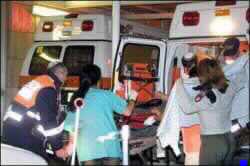- Author:
& News Agencies - Section:
WORLD HEADLINES
- Hajj & Umra WORLD HEADLINES
Sharon ponders response to "Sabbath Ambush" as West Bank killing goes on

Israeli Prime Minister Ariel Sharon weighed a response to what has been dubbed the Sabbath Ambush, one of the worst shooting attacks carried out by Palestinians during their uprising, as deadly violence carried on elsewhere in the West Bank.
"Mr. Sharon has been kept informed of those events and engaged in intense consultations with Defense Minister Shaul Mofaz," the premier's chief of staff, Dov Weissglas, said on Israeli public radio.
"Measures that have to be taken will be taken indeed," he added.
He was referring to back-to-back ambushes in the southern West Bank city of Hebron Friday evening by the resistance group Islamic Jihad. Twelve Israelis -- nine occupation soldiers and policemen and three settlers -- were killed and 14 wounded.
Weissglas did not say whether Sharon had convened a meeting of his security cabinet, which usually occurs before any massive retaliation to a serious Palestinian attack.
Nor did he say whether Israel was considering reoccupying the Palestinian areas of Hebron, from which the occupation army withdrew three weeks ago.
The divided West Bank city is home to 600 radical Jewish settlers living in enclaves amid 120,000 Palestinians and has been a regular hotspot in the 25-month-old Palestinian uprising.
The attacks drew harsh condemnation from Israeli officials, as well as from UN chief Kofi Annan, but the initial reaction on the ground was limited.
Two Israeli helicopter gunships fired on central Gaza City early Saturday, destroying a metal workshop and wounding two Palestinians, Palestinian security sources said.
The occupation army confirmed the attack, saying the workshop was used for manufacturing weapons.
Separately, Palestinian residents of Hebron said the house that had served as a hideout for the Hebron resistance men had been bulldozed by the occupation army and that the Palestinian part of the city was being patrolled by Israeli occupation forces, who had searched a house there.
Meanwhile, as Israel reeled from the attack occupation troops continued operations elsewhere in the West Bank.
In Nablus, a 21-year-old woman was killed inside her house when an Israeli occupation tank opened fire with heavy machine guns, Palestinian medical sources said.
Residents in the area said the curfew was fully enforced on occupation army-reoccupied Nablus and that no incident was taking place at the time of the shooting.
In Jenin, a Palestinian teenager belonging to Islamic Jihad was shot dead when Israeli occupation troops stormed into the city and its neighboring refugee camp, a spokesman for the group said.
Ibrahim Saadi, 18, was the son of Basaam Saadi, the leader of Islamic Jihad in the Jenin area, the spokesman said.
Islamic Jihad said the Hebron attacks were to avenge Israel's killing last week of the group's chief in the West Bank city of Jenin.
A statement received by AFP in Beirut said "our operation came in response to the assassination in Jenin of the martyr chief Iyad Sawalha and to the Zionist crimes targeting our towns, villages and camps."
"Our jihad (holy war) will continue, our operations will continue and candidates for martyrdom are ready," it added. The term martyr is used to refer to resistance bombers.
Israeli foreign ministry spokesman Gilad Millo said "this sabbath ambush is the second time in a week that innocent civilians have been senselessly murdered either in their beds or on their way to prayers. No political process can take root while these atrocities continue to be carried out by Palestinian terrorists.
"We blame the Palestinian Authority (of Yasser Arafat) for not doing its job; we don't blame the Palestinian people, but those who continue a strategy of terrorism," he said.
The occupation army set up a new checkpoint just outside the Palestinian leader's battered compound in the West Bank town of Ramallah, three hours after the Hebron shooting.
The Jewish worshippers hit in Friday's attack were returning from prayers at the Tomb of the Patriarchs, which is the traditional burial site of Abraham, father to both the Arab and Jewish nations.
Senior foreign ministry spokesman Gideon Meir said that among those hurt were occupation soldiers who earlier had provided protection for Palestinian worshippers going to pray at the tomb, a site holy to both Muslims and Jews.
"We pulled back to make sure that especially today, a Friday during (the Muslim holy month of) Ramadan, they could pray to their god at the tomb," he said.
Weissglas said "the assailants took advantage of the relaxation in Hebron decided by Israel for Ramadan to ease living conditions for (Muslim) residents, to carry out this shameful attack against Jews coming home from Sabbath prayers at the synagogue."
In New York, Annan said he was "horrified by the despicable terrorist attack in Hebron." A statement said he "condemned in the strongest terms this attack against Israeli citizens."
He added that he continued to be convinced that there is no alternative to a political solution to the Israeli-Palestinian conflict.
PHOTO CAPTION
An Israeli, injured in a Palestinian ambush, arrives at the hospital
Related Articles
 Hajj virtues
Hajj virtues
-
School of Faith in Ten Days of Thul-Hijjah
The believing human self needs strong provocations in order to awaken whenever it is enveloped by laziness in...
-
The Status of Hajj in Islam
Hajj is the fifth pillar of Islam; Allah, The Exalted, ordained it in the ninth year after Hijrah (the Prophet's,...
-
School of Faith in Ten Days of Thul-Hijjah
The believing human self needs strong provocations in order to awaken whenever it is enveloped by laziness in relation...


 Home
Home Discover Islam
Discover Islam Quran Recitations
Quran Recitations Lectures
Lectures
 Fatwa
Fatwa Articles
Articles Fiqh
Fiqh E-Books
E-Books Boys & Girls
Boys & Girls  Hajj Rulings
Hajj Rulings Hajj Fatwas
Hajj Fatwas












